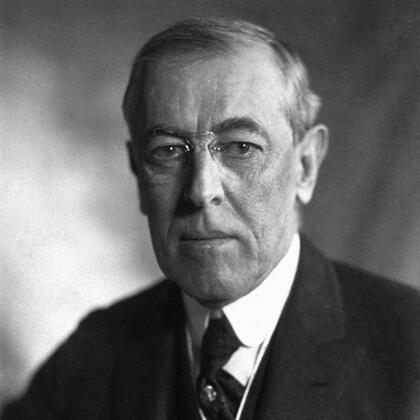- Name
- Johns Hopkins Media Relations
- jhunews@jhu.edu
- Office phone
- 443-997-9009
The Johns Hopkins Name Review Board issued a recommendation on the continued use of the name of Woodrow Wilson—who earned a PhD from Johns Hopkins University in 1886 and went on to become the 28th president of the United States—in connection with an undergraduate fellowship program and a named entry to a Homewood campus residence hall.
The Name Review Board, or NRB, was created to consider requests to rename, de-name, and/or add context to buildings, features, and programs at Hopkins that recognize individuals whose legacies may now be considered antithetical to the institution's values. Through its deliberations, the NRB determined that in instances in which a name adorns more than one feature, it would consider each feature independently—taking into account its location, the nature of the original naming, and those affected, and weighing the importance of not simply erasing aspects of the institution's history.

Image caption: Woodrow Wilson, 28th president of the United States
Throughout its year-long deliberation process, the NRB spent significant time considering the full range of Woodrow Wilson's legacies. After multiple discussions and a thorough review of archival records and documents, it recommended:
- Retaining the name with contextualization on the AMR I Wilson House entry; and
- Removing the name from the Woodrow Wilson Undergraduate Research Fellowship; going forward, the fellowship will be known as the University Undergraduate Research Fellowship and may be renamed in the future.
Both recommendations have been approved by the university's board of trustees.
"As the only United States President to hold a PhD, which he earned from Johns Hopkins University in 1886, the NRB determined that Woodrow Wilson's connection to the institution was significant," Sarah O'Hagan, a SAIS graduate who serves as vice chair of JHU's board of trustees and chair of the NRB, wrote in a message to the individuals who asked the NRB to evaluate the use of Wilson's name.
"Retaining the name with contextualization at the Wilson House entry in AMR I provides the university an opportunity to recognize Wilson's connection to Johns Hopkins University and the Homewood campus, acknowledge his accomplishments and his failings, and engage the Homewood community, particularly students, in important conversations on complex legacies. … Simultaneously removing the name from the fellowship places the responsibility for contextualization of the university's history and the full complexity of Wilson's legacy on the institution rather than on individual students and alumni."
In making its recommendations, the NRB took into account Wilson's global and domestic achievements, which include creating the League of Nations, the Federal Reserve System, and the Federal Trade Commission; enacting labor laws that established the 8-hour workday and restricted child labor; supporting the passage of the 19th Amendment, granting women the right to vote; and appointing Louis Brandeis, the first Jewish justice to sit on the U.S. Supreme Court. Elected to the presidency in 1912, he served two terms, until 1921.
The board also weighed the impact of his administration's actions and policies on Black Americans. This includes the segregation of federal workspaces in Washington, D.C., a reversal from previous presidential administrations that resulted in the demotion and demeaning of Black workers in the federal government. Wilson's legacy also includes racist views and writings and a tenure as president of Princeton University during which he used his administrative authority to ensure the study body remained white and male, including by discouraging Black applicants from applying.
The university's Name Review Board was established by the Committee to Establish Principles on Naming, a group charged with developing a set of principles and a process to evaluate renaming requests. A parallel effort, the Diverse Names and Narratives Project, seeks to more visibly honor and celebrate remarkable people from the institution's history, with a specific focus on those from historically marginalized and underrepresented groups. And two historical research endeavors—the Reexamining Hopkins History initiative and the Hard Histories at Hopkins project—are exploring the role that racism and discrimination have played at the institution throughout its history.
The NRB is made up of more than 50 representatives from across Johns Hopkins and from the university's nearly 260,000-member alumni community. The group considers requests concerning buildings, features, and programs at Hopkins through a thorough, deliberative, multi-step process culminating in submission to JHU President Ron Daniels and the board of trustees for approval. The NRB can take several actions—keep the name as it is; retain the name, but either relocate the named feature or add relevant, interpretive information (contextualization); retain the name, but with a recommendation to institutional leadership to redress community harm associated with the name through investment or other material means beyond contextualization; or recommend removing the name.
Posted in University News
Tagged university history








